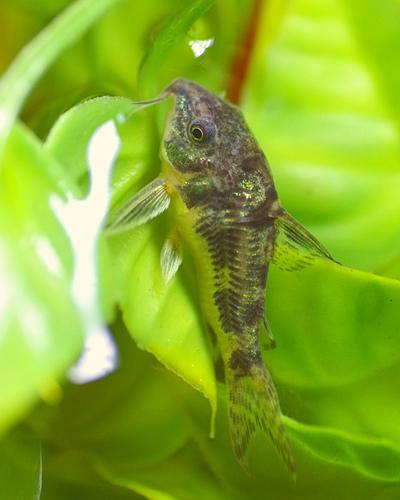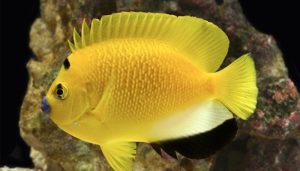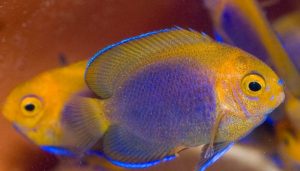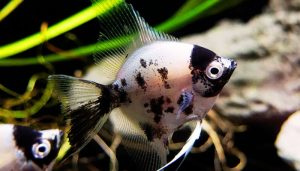The Punctatus Cory Catfish is a delightful addition to any aquarium, captivating fishkeepers with its unique spotted pattern and peaceful nature.
These bottom-dwellers not only enhance the beauty of your tank but also contribute to its health by keeping the substrate clean. Perfect for beginners and experienced aquarists alike, this hardy species is a favorite for its low-maintenance care and friendly temperament, making it a joy to observe and care for.
But what does it take to keep the Cory punctatus fish thriving? Providing the right environment, diet, and companions is key to unlocking their full potential.
These little wonders flourish when their specific needs are met, showcasing behaviors that make them even more endearing.
From their social antics to their efficient scavenging, they bring life and balance to your aquarium in ways you might not expect.

In this care guide, we’ll explore everything you need to know about the Punctatus Cory Catfish—from ideal tank setups and feeding routines to tips for keeping them happy and healthy.
Whether you’re a seasoned hobbyist or just starting your fishkeeping journey, this guide will help you create the perfect habitat for your Punctatus Cory Cat fish. Let’s dive in and get started!
Table of Contents
ToggleHow Big Do Punctatus Cory Catfish Size Get?
Punctatus Cory fish is small, and typically reach a maximum size of about 2.5 inches (6.4 cm). They have a distinctive black stripe along their sides, which is why they’re also commonly known as panda Cory catfish.
Their size makes them ideal for small aquariums, provided they are kept in groups of at least five or more. They can also make good community aquarium fish, but choose tank mates that won’t outcompete them for food or intimidate them.
Male doras skin possesses remarkable features that distinguish them from their female counterparts, including male markedly longer and thicker pectoral fins decorated with spikelets.
Do Cory Catfish Clean the Tank?
Absolutely! Cory Catfish are among the most efficient cleaners of aquarium tanks. Commonly known as “armored catfish” or “Cories,” they are members of the Family Callichthyidae and have specially adapted barbels that enable them to scavenge for food along the bottom of your tank.
They help keep it clean by eating uneaten food, dead plant material, detritus, and algae. As a result, you can expect fewer ammonia spikes in your tank due to their mealtime efforts.
Additionally, Cory Catfish will stir up the substrate with their waste when they root around looking for bits of leftover food or dead organic matter.
This helps ensure even water circulation between all parts of the tank while keeping both dissolved oxygen and carbon dioxide levels steady throughout – essential factors in maintaining healthy water chemistry for your other aquatic lifeforms.
In summary, Cory Catfish are adept at performing frequent cleaning operations within a maintained aquarium environment, which helps maintain a safe habitat for many types of other gregarious bottom fish and invertebrates while reducing maintenance needs.
On behalf of owners in terms of frequent filter changes or substrate cleaning due to excessive waste buildup from other fish species in the same space.
Are Cory Catfish Easy to Care for?
Cory Catfish (also known as Corydoras, Corydoradinae, or callichthyid catfishes) is a type of freshwater fish that make an excellent addition to any aquarium. They are attractive and fun to watch and relatively easy to care for.
Punctatus Corydoras fish Care Tips
Corys are hardy fish that can adapt to varying water conditions with minimal effort from the aquarist.
In terms of diet, they can eat most of the fish food items available in stores; these live or frozen prey foods include quality flake food and pellets with occasional treats such as live worms, insect larvae, frozen bloodworms or worms brine shrimp “live or frozen brine shrimp.”
Alternatively, they may even graze on algae growing on plant leaves and rocks! As omnivores, it is essential to feed them a balanced diet containing both vegetable and animal-based food sources for optimal health.
In terms of Corydoras tank setup requirements for spotted Cory catfish, these animals prefer tanks with sand or fine gravel substrate so that their barbels—sensitive touch organs located at the front near their mouths—don’t suffer abrasions when stirring up sediments in search of food.
Tanks should also be well-oxygenated by having multiple aeration sources like good water conditioners, airstones, or small powerheads throughout the aquarium.
Additionally, caves and driftwood should be provided if possible to give individuals adequate hiding spots away from more aggressive species in mixed communities due to their smaller size than other commonly found south American catfish species like Plecostomus”.
Overall, cory catfish are straightforward creatures who need only basic care parameters met, such as adequate filtration levels suitable for tropical fish keeping along with weekly cleanings/water changes monitored through chemical testing kits (like pH/ammonia).
This commitment towards providing your cories a good home environment with proper nutrition and its naturally hardy nature makes it one of the easier pet fishes out there!
Punctatus Cory Catfish Tank Size
Corydora puntatus are relatively small fish and only grow to around 2 inches in length. As such, a single Cory Catfish can be kept in a smaller tank, such as a 5-gallon Nano aquarium, but two or more Cory Catfish should be kept in at least a 10-gallon aquarium.
When keeping larger groups of punctatus catfish, it is best to provide plenty of swimming room by having a 20-gallon or very large aquariums for the fish to roam around.
This ensures that all individuals have enough space to thrive and establish territories. Additionally, Cory Catfish are schooling species and prefer to be kept in groups of at least five.
In terms of tank decorations, the Corydoras puntatus enjoy having some cover, like caves, driftwood, or plants which they can use to hide from more aggressive species in the aquarium.
This is especially important for younger Cory Catfish, who are more vulnerable to predation due to their smaller size.
Lastly, an aquarium heater should be added to provide the optimal water temp for Cory catfish between 75-80°F.
Overall, with proper care and maintenance, Cory Catfish can make delightful additions to any aquarium and are relatively easy for most aquarists to keep!
They have an active temperament, making them a joy to watch as they swim around their tank and explore the substrate for food.
Furthermore, if given good tank conditions, these hardy fish can live for many years in captivity and become loyal pets!
Cory Catfish care made easy. Cory Catfish can make beautiful additions to any aquarium with a few simple steps to follow and some dedication from the aquarist.
How Many Species of Corydoras Are There?
There are a total of 171 species of Corydoras that have been described, though the IUCN Red List only recognizes 166 valid species.
These 171 species are divided into six genera: Corydoras, Brochis, Scleromystax, Aspidoras, and Lepthoplosternum pectorale.
The most common species of Corydoras haraldschultzi kept in home aquariums is the popular punctatus Cory fish, also known as the “common” or “bandit’ Corydoras.
Most Common Genus Corydoras Species (Types of Corydoras list)
· Armored Cory Catfish
· Bronze Corydoras
· Panda Cory
· Pygmy Cory
· Panda Fish
· Corydoras julii
· Albino Cory
How Much Does a Cory Cat Cost?
Cory Catfish are relatively inexpensive, ranging from around $3 to $15 per fish. In terms of supplies, Corydoras are easy to care for and can be kept in aquariums as small as five gallons.
Therefore, owning one or more Cory Catfish should be, at most, the initial cost of the fish itself.
Corydoras Punctatus for Sale
Wild-caught Corydoras punctatus nanay, or the spotted catfish, has a unique spot pattern that makes it easily identifiable. It is found swimming in tropical waters along two river basins: the Suriname river basin and the iracoubo river basin. Its natural habitat offers this species an abundance of resources to thrive!
While this species requires slightly cooler and softer water temp for Corydoras compared to many tropical aquarium fish, it can still be found for sale in pet stores and online with relative ease from planet catfish.
When buying Corydora punctatus fish, ensure you always source from reputable sellers with healthy specimens with bright colors and alert behavior – look out for signs such as pale gills or sluggish responses, which may indicate something wrong with the fish.
It’s also best if you purchase several at once (at least four) since these are Sociable creatures who enjoy being part of schools rather than living alone!
And lastly, when introducing spotted Cory catfish punctatus into your aquarium, it’s always advisable to quarantine them separately to ensure any potential illnesses don’t spread throughout your whole ecosystem – parasites thrive on weakened hosts, after all!
Commonly Asked Questions about Punctatus Corydoras Care (FAQ)
How Many Corydoras Catfish Should Be Kept Together?
Keeping at least five Corydoras fish in the same aquarium is recommended. This allows them to stay together in a school, as they are quite sociable creatures who enjoy the company of their cory species.
What Is the Rarest Cory Catfish?
The rare Cory catfish species is the Leopard Frog CORYDORAS. It has a unique pattern that makes it stand out from other species of Corydoras. It is not commonly found in pet shops, so it usually needs to be ordered from specialist breeders or fish suppliers.
Can Punctatus Cory Catfish Live with Bettas?
Corydora puntactus can live in the same tank as Bettas; however, caution should be taken when introducing them into the same aquarium.
Are Cory Catfish Nocturnal?
No, Cory Catfish are not usually nocturnal. They can be active day and night but will generally become more active when the lights are dimmed. They also enjoy having plenty of hiding spots in the breeding aquarium, such as caves and plants, where they can rest without being disturbed.
What is the average albino Cory catfish lifespan?
How long do albino cory catfish live? Albino Corydoras catfish lifespan averages 5-8 years with good water quality and care. They can even live up to 10 years in ideal conditions.
What temperature do Corydoras like?
Best corydoras water temp: what temp do Corydoras like? The ideal pygmy Corydoras temperature is between 72-78°F (22-25°C). They thrive in stable water conditions with gradual temperature changes.
what is the perfect peppered Cory temperature?
Best temperature for Corydoras: The optimal peppered cory catfish temperature is between 72-78°F (22-25°C). Like other Corydoras species, they prefer stable water conditions.
How long will my catfish live?
The catfish life expectancy varies greatly depending on the species. Some live only a few years, while others can live 10-15 years or longer with proper care.
How big do albino Cory catfish get?
Albino Corydoras catfish typically reach a maximum size of 2-3 inches in length. They are a smaller species of Corydoras compared to others.
What is the average panda Corydoras lifespan?
The average panda Corydora lifespan in a well-maintained aquarium is 10-15 years. With excellent care, some may even live longer.
What is Cory catfish max size?
Cory catfish are known for their small size! Most Corydoras species only grow to be 1-2.75 inches long, with some reaching up to 4.75 inches.
What is the ideal albino cory catfish temperature?
Optimal albino Cory temperature: Albino Corydoras, like most cory catfish, thrive in temperatures between 72-82°F (22-28°C). This albino corydoras temperature celsius range mimics their cool, freshwater habitats.
How to gender Corydoras cat fish?
Distinguishing male from female Corydoras catfish relies on body shape. Females appear rounder and wider, while males have slimmer bodies. Look from above for a “raindrop” shape (female) or “airplane” shape (male).
What do panda Cory catfish eat?
Panda corys are omnivores, enjoying a mix of sinking fish food, live or frozen bloodworms, and occasional algae wafers for a balanced diet.
What is the best water temperature for cory catfish?
Ideal aquarium temperature for cory catfish depends on the species, but most thrive between 72-82°F (22-28°C). Some prefer cooler (72-75°F), while others tolerate slightly warmer (up to 82°F).
What temperature do Julii Corydoras like?
Optimal Julii Cory temperature is between 72°F and 79°F (22°C and 26°C). They can tolerate slight variations, but stable corydora temperature range Is key for their health.
What temperature do panda Corydoras like Celsius?
The perfect panda cory catfish temperature: Ideal panda Corydoras temperature is between 20-25°C (68-77°F). They prefer cooler water than most tropical fish.
How many cory catfish in a 10 gallon tank?
A 10-gallon tank is suitable for 3-4 Corydoras catfish. Overcrowding can stress them and compromise water quality, so choose your number carefully.
What is the perfect green Cory catfish temperature?
Aim for 72-78 degrees Fahrenheit for your green Cory catfish. This range keeps them comfortable and thriving.
How long do albino catfish live?
Albino catfish, also known as Corydoras Aeneus, can live 5 to 8 years in a well-maintained aquarium with good water quality.
How many Cory catfish in a 30 gallon tank?
For a 30 gallon tank, a good starting point is 6-8 Cory catfish. This number can vary depending on the specific Cory species you choose, as some grow larger than others.
Where are Corydoras from?
Corydoras catfish are native to South America, ranging from the Andes Mountains to the Atlantic coast and from Trinidad to northern Argentina.
Do Cory catfish breathe air?
Yes, Cory catfish can breathe air! They have a special organ that extracts oxygen from air gulps at the surface. This helps them survive in low-oxygen environments.
How many Cory catfish in a 20 gallon tank?
6-8 Cory catfish is a good starting point for a 20 gallon tank. Aim for smaller species like pygmy corys for a higher number.
What do Corydoras eat?
Corydoras are omnivorous bottom feeders. They love sinking wafers, insect-based flakes, and occasional treats of live bloodworms or brine shrimp.
How often do Cory catfish lay eggs?
Cory catfish can lay eggs every few weeks, but it depends on species, tank conditions, and fish health.
What is the albino cory max size?
Albino corydoras catfish, a peaceful bottom dweller, grows to a maximum size of around 3 inches (7.5 cm). They are social and thrive in schools of 6 or more.
What do julii cory catfish eat?
Julii corys are omnivores that sift the bottom for scraps and living things. Offer sinking pellets, flakes, and occasional treats like bloodworms for a balanced diet.
Conclusion
The Corydora punctatus is an excellent addition to any freshwater aquarium. They are relatively low-maintenance and can help keep your tank clean. Be sure to provide them with plenty of hiding places and gravel or sand substrate so they can stay comfortable and healthy. With the proper Cory punctatus care and regular and successful breeding, your punctatus Cory catfish will thrive in your home aquarium for years to come!
You might also like
- How Many Cory Catfish Should Be Kept Together in same Tank?
- Gold Laser Cory: Size, Lifespan, Breeding & (More)
- Top 10 Best cory cat types for Aquarium (Beginners Guide)
- Lifespan of Cory Catfish: how long do Corydoras live?
- Does Cory Catfish Eat Algae? Top 10 Best Algae Eaters (List)
- False Julii Cory Vs Julii Cory: 3 Ways to Spot Them Apart!




